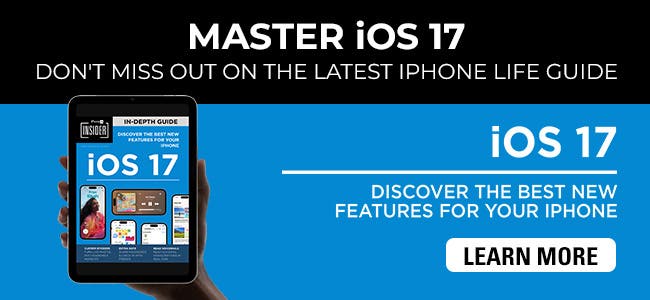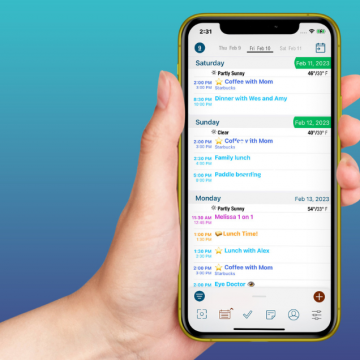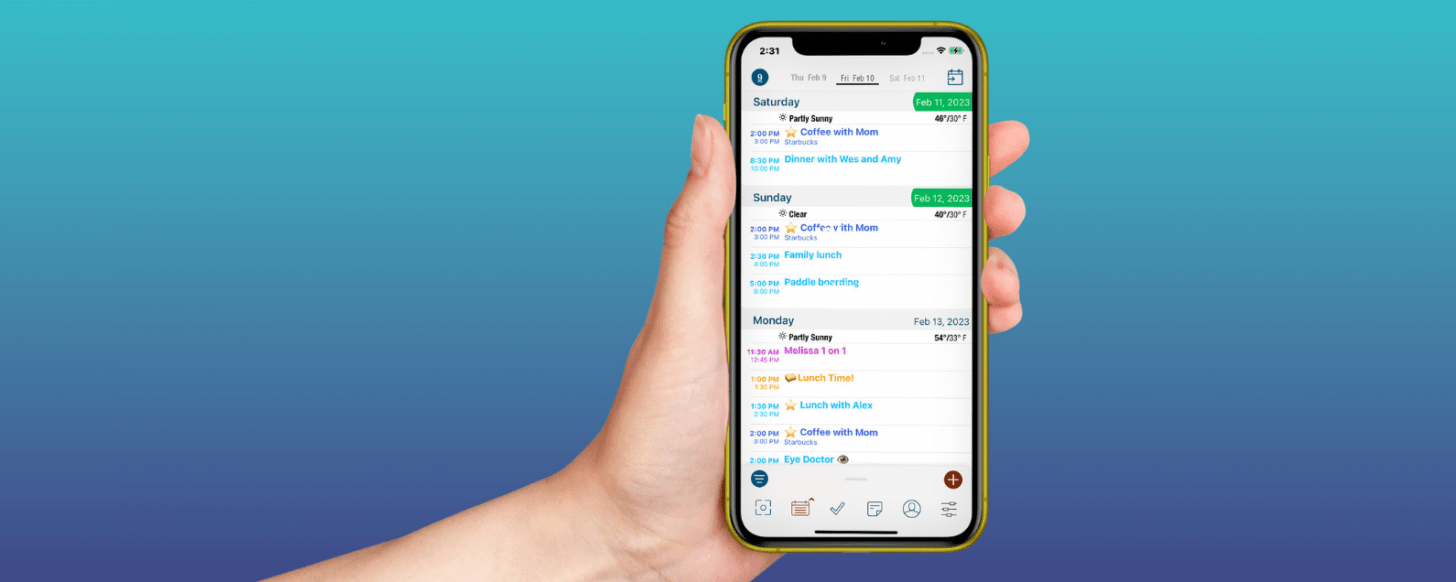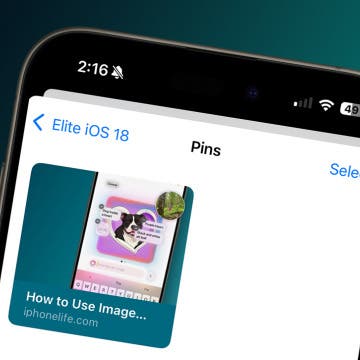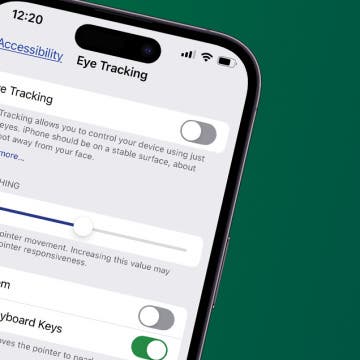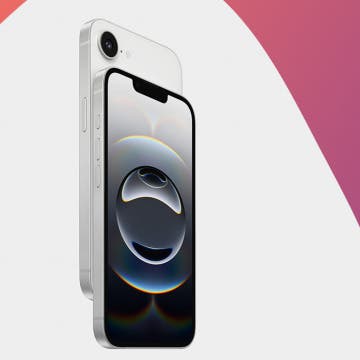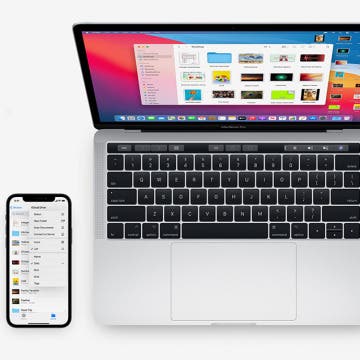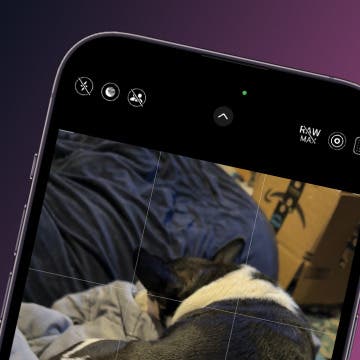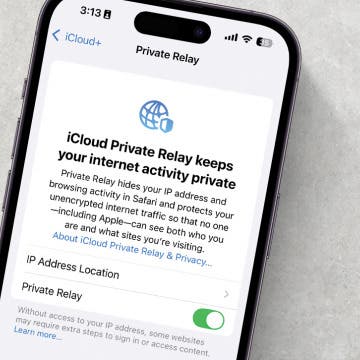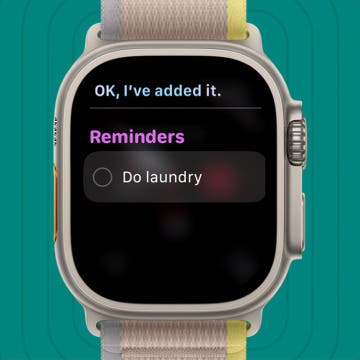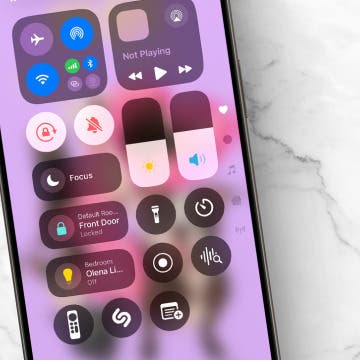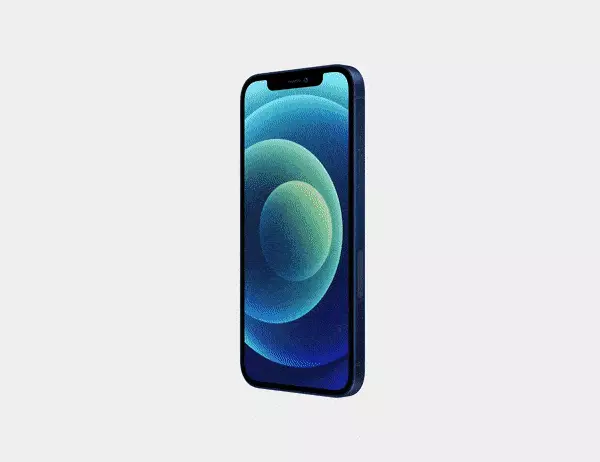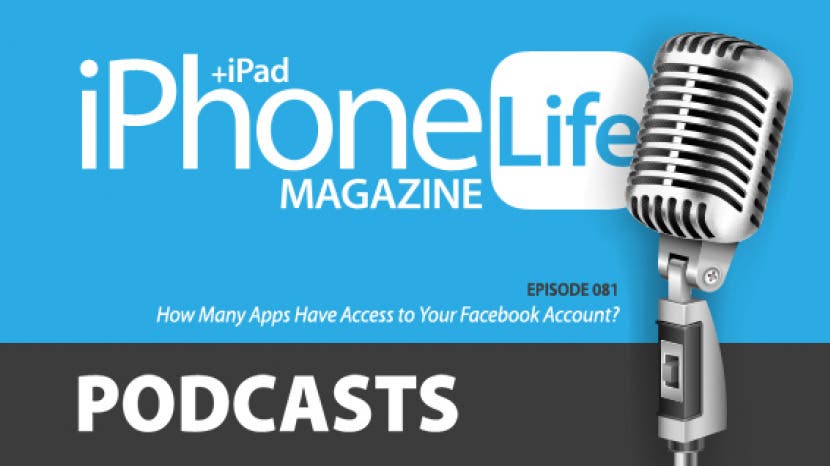
In light of Facebook's recent data leak that compromised the personal information of up to 85 million users, the iPhone Life team shares advice on how to check on and delete third-party apps you've granted access to your account in order to help you protect your data from getting into the wrong hands. Other topics include iOS 11.3 bugs and Apple's new iPad and red iPhone 8.
Click here to listen and subscribe. If you like what you hear, be sure to leave a review. And remember to tune in every other week to hear our editors share with you the latest Apple news, best apps, iPhone tricks, and coolest accessories.
This episode is brought to you by JAMF. Seamlessly set up and manage all of your Apple devices with Jamf Now. This cloud-based mobile device management software allows you to remotely configure (everything from Wi-Fi settings to email accounts) all of the iPads, iPhones, and Mac computers at work.

This episode was recorded using high-quality mics from Blue Microphones.
Question of the week:
How many apps have you given Facebook permissions to? Bonus question: Have you turned off throttling on your iPhone and if so, how is it working for you? Email podcasts@iphonelife.com to let us know.
Articles referred to in this episode:
- How to Delete Privacy-Invading Facebook Apps on iPhone
- Embarrassing Tech Mishaps: The Naked Skyping Edition
Useful links:
- Become an iPhone Life Insider
- Sign up for the free Tip of the Day Newsletter
- Email the Podcast
- Subscribe to iPhone Life magazine
Transcript of Episode 81:
Donna Cleveland: Hi, and welcome to episode 81 of the iPhone Life Podcast. I'm Donna Cleveland, editor in chief at iPhone Life.
David Averbach: I'm David Averbach, CEO and publisher at iPhone Life.
Sarah Kingsbury: And I'm Sarah Kingsbury, senior web editor at iPhone Life.
Donna Cleveland: Each episode, we bring to you the best apps, top tips and great gear in the iOS world. This episode, we're going to start off with a tip about Facebook. As you all know, Facebook has been in the news a lot about some of their privacy policies that has resulted in, I think up to 80 million users potentially having their information leak to Cambridge Analytica. We have a tip here that will help you protect your information, so that this does not happen to you in the future. It's too late for this round. Before I tell you that tip though, we want to tell you about our sponsor, Jamf.
David Averbach: Yeah. Jamf is a new sponsor of ours. I don't know that I've had an opportunity to tell you guys about them on the podcast before. We're really excited to have them. What they do is they have cloud-based software. It allows you to manage your iPhone and iPad for enterprise. If you are a small to mid-size business, it's something that's worth checking out. What they do is basically if you're small to mid-size business that provides iPhones to your employees, they allow you to do a number of things and make this easy. First of all, they allow you to set up your device really quickly and easily for your employees, and that means you can load in. If you have custom apps, if you need to set up their email, things like that, you can load that in really quickly. They also have a lot of security settings that are really nice to be able to manage, and they let you manage your device overtime. If you want to update those apps, you want to update people's security settings overtime, they'll let you manage that remotely.
Really great software, saves a lot for ... If you have a small to mid-size business that provides iPhone and iPad to your employees, and they let you try it for free and they let you, up to three devices, set it up for free as well. Make sure you check it out.
Donna Cleveland: Cool. Now, back to Facebook. First, I wanted to ask you guys, when you set up apps with Facebook, do you usually allow Facebook permission to access your information?
Sarah Kingsbury: I always only let them access my public information, which would be like my profile photos and top image photos. If they basically insist on more like information about my friends, or more personal information about me, I choose not to use the app.
Donna Cleveland: What about you, David?
David Averbach: I hate password management. It's really a hassle, and so I tend to use Facebook login for most things. When they have the little thing that pops up, I'll sometimes uncheck things that I don't wanted to follow to grant access to. For the most part, I don't really proactively manage it though and I'm just dealing with the privacy side effects.
Sarah Kingsbury: Okay. I actually have logged in to a few apps like Tinder, and Instagram with Facebook, but now I'm reconsidering like doing that in the future for sure, but there's only a few apps that I've done that with.
Donna Cleveland: Yeah. With this tip that we're about to tell you, I discovered that I had hundreds of apps that I don't allowed Facebook login ... I'd logged in with Facebook, and I wasn't fully aware of really what I was allowing. It's convenient, and the same with you, David. I tend to err on the side of the convenience over security sometimes. Now, I'm rethinking that. Let's just fill people in quickly on what's been going on with Facebook. I told you guys a little bit, but have you guys been following this in the news?
David Averbach: I have been following a pretty close in news and I have some really strong feelings about it.
Donna Cleveland: Let us know. Yeah.
David Averbach: Do you wanted me to give me a brief update of what's happening?
Donna Cleveland: Yeah. That will be great.
David Averbach: Because I feel like what the headlines are for most of the news stories are actually different than what actually happened. Basically, what happened was there was a consulting group that's based in the UK that was consulting for Trump during the elections.
Donna Cleveland: Is this Cambridge Analytica?
David Averbach: Actually, it isn't Cambridge Analytica. Cambridge Analytica was a group that was then founded with this group, and there was a scientist who was based in Cambridge, and Facebook allows people who are doing research to have extra access to people's profiles. In order to do their research, you have to apply for this, you have to get permission to it. When you get permission for it, you're not allowed to share this or sell it. This person, this scientist from Cambridge got permission to do this and what he had was basically a test that analyzed ... It's like one of those personality profiles of five major questions. I don't exactly remember ...
Donna Cleveland: Like how well do you know yourself or friends?
David Averbach: Yeah. Well, it's like you have a lot of these people doing like INFP, and things like that. It's a similar psychological profile that you can give yourself to see what your personality is.
Donna Cleveland: Okay.
David Averbach: It's a more comprehensive than like, "How well do you know your friends?" It's somewhat legitimate profile of your five major categories. What he did is he had people who took this test. I think it was like 200,000 people took this test, something in that range. I'm speaking without notes in front of me, or I guess do fact check me, but because he was doing scientific research, Facebook allowed him to have access to not just the people who took the study, but friends of the people who took the study. That's something that my understanding is Facebook does not typically allow people to have access to. It allows you to maybe ... I'm not exactly sure where the bounds are, but I know that this person have extra access. They then went and sold both the results of the test and the access to the friends' profiles of the people who took the test to this consulting group. They formed the new thing, which is Cambridge Analytica, which is basically the new consulting group that ended up doing all these.
What you ended up being able to do was take the profiles of these people who took the test, which is maybe around 200,000 people and then match that with their likes and dislikes and then take that and build that profile for other people based on their likes and dislikes. They ended up with the kind of this thing where they could say, "Okay. This person has these five things for our personality types like agreeableness and assertiveness," things like that. I don't remember exactly. Then, they say, "Well, if you like this band, you're more likely to match this agreeableness or assertiveness," and things like that. One of them was like, "If you like Dwyane Wade, then you are less likely to be confrontational." Those things like that. Then from there, they're able to then target them based on these profiles people who had not actually granted access to this company.
Donna Cleveland: The people who didn't ... They weren't part of the actual 200,000, you're saying you could assess them based on the things they liked?
David Averbach: Yeah.
Donna Cleveland: Okay. Got it.
David Averbach: Part of why I'm explaining all the details is that a lot of that information, I don't think I was summarized to most people, and so there's a few pieces in that. A leaps in that, that I think are important. When we're talking about Facebook access, allowed access to Cambridge Analytica so that you could hack people's minds for political gain, I think there's a lot of sensationalism there. Number one is most apps don't allow you to have the access that Cambridge did. Cambridge had it because Facebook allowed them to have extra access to people's profiles in the name of science, which then the person went and illegally sold.
Donna Cleveland: You're saying in some ways it was like one bad actor?
David Averbach: There's a lot that Facebook did wrong here.
Donna Cleveland: Yeah.
David Averbach: I'm not saying they're not, but people are then taking that and I think expanding it too far in terms of any app could have access to all of your information.
Donna Cleveland: A lot of apps can have access to a lot of your information. If you take those maybe less academic quizzes that are like who were you in your past life? Before you can take the quiz, they're like, "Give us access to your friends' list," and you can choose not to do that. That, I've always been pretty careful about. I never let apps post on my behalf too. I think it's weird that they even would ask.
David Averbach: Yeah.
Donna Cleveland: Yeah.
David Averbach: I think even if you do grant access in those test to view your friends' Facebook limits pretty strictly, what those apps can and cannot access in a way that they did not limit it in this case because it was for scientific research. I don't think you can build current personality profiles. The second piece ... The first piece, I think is overblown is how much access these apps have, although they certainly have a concerning amount of access. The second piece that I think is overblown is exactly how much influence these people were able to wield from this? To me, the fact that it was a personality profile and then you could build that based on the likes and interest of people around you has potentially scary ramifications, and for future ideas of how somebody might use this, but in this case, when you actually dug into it, it didn't feel like Cambridge Analytica was able to hack our minds in quite the way that like it's this fun in the media.
Donna Cleveland: But they're trying to.
David Averbach: It's like are they really targeting people who liked Dwyane Wade because they're not going to be confrontational? It seems like loose correlations based on loose science to begin with sort of things especially when Facebook actually lets you target pretty well how ... Like whether you're liberal or whether you're republican and where your leanings are even within that scale, so it's funny that they went about it in such a round of that way.
Donna Cleveland: I see what you're saying, but I do feel ... In a lot of ways, I think the reason that a case like this got so much attention is already ... It feels like the internet is going this way a lot like retargeting ads, those ads that follow you around and seem to be reading your mind. It almost feels like you have a conversation, and then there are ads after you. I know that that's paranoid because you probably searched something or did some behavior, but it does seem like there need to be some push back that we need to emphasize more privacy for people. I think Facebook ... I was listening to an interview of Sheryl Sandberg, and I found it to be disingenuous that this attitude that Facebook just didn't know that information could be used this way and now they're realizing it and making steps.
Sarah Kingsbury: I feel like Facebook is already using this information that way, right?
Donna Cleveland: Yeah.
Sarah Kingsbury: I just assume they already know everything about me, but if they do, then they should be protecting that information.
Donna Cleveland: Yeah. Then, going in and seeing this over the years like hundreds of apps that I've given access to, I think it isn't uncalled for people to have an uncomfortable reaction to that realizing even if it's not Facebook's usual way that they do things that somehow 80 million people's information was accessible to this firm is disturbing.
David Averbach: I completely agree. I think to me, what ... I think there's a lot of legitimate concerns about Facebook and privacy, Facebook and how it affects our behavior, Facebook and politics. There's a lot of very legitimate concerns. I'm happy we're having these dialogues. I think that Cambridge Analytica, while maybe it's good that it's like catalyst for these dialogues is actually a confusing way into a conversation that we need to have, and that it's not actually, in my opinion, the important thing. Now, that being said, I think there's a lot of concerning things with Cambridge Analytica as well. How much do Facebook know? When did they know it? When did they disclose it? I'm not saying it doesn't matter.
Donna Cleveland: Right. Right.
David Averbach: I'm just saying it's a very confusing way to have this conversation, which I think is important.
Donna Cleveland: Yeah. It's part of a bigger privacy issue that is really what we needed to be paying attention to, like how much access to your personal information are you granting different entities, and how well can you trust them to protect it, which seems like probably not at all.
David Averbach: Yeah.
Donna Cleveland: Yeah. I think you're right, David, that the coverage did make it sound like potentially this is ... Sway the election, or things like that, which from the way you're telling it, it sounds like that would be a bit of a dramatic statement potentially.
David Averbach: Yeah.
Donna Cleveland: Should I get into how you can go and check on your own privacy settings?
David Averbach: Yes. Yes.
Donna Cleveland: Do you guys have [inaudible 00:13:16]? If this conversation is making you a little nervous, and you're not sure how many apps you granted information to, you can open your Facebook app on your iPhone. The tip I have here is for your iPhone or iPad specifically. It will be a little bit different if you are doing it on your desktop. You tap the three bars at the lower right corner of your display, scroll down, tap on settings and privacy. Another thing to keep in mind with this is that Facebook has different versions of the app that they're testing at different times, so yours might vary a little bit from this, but you'll find settings and privacy somewhere around here. Once you've gone to settings and privacy, scroll down and tap on privacy shortcuts, and there, you'll find an option called privacy checkup. This will take you through a quick process that will show you what information you have public on your account and then after you've done that, you'll get to the part where you'll see all the apps that you granted access, Facebook access to.
There, you can go through and modify how much access they have or delete them altogether, and I went through and deleted all but four of them, and it took me about 20 minutes because I have so many. Yeah. I highly recommend going and at least checking that out, and making sure that all of the settings are what you would want them to be.
David Averbach: Can we make this the question of the day too? Did Cambridge Analytica and all of these concerns, has that affected how you use Facebook? I'd be really curious to hear that.
Donna Cleveland: You can write into how many apps you've granted Facebook access to?
David Averbach: And remove Facebook access too as you go through this tip.
Donna Cleveland: Yeah. Email us at podcast@iphonelife.com. We hope this tip of the week is helpful for you. If you want to get a tip in your inbox every day teaching you how to get the most out of your iPhone or iPad, go to iphonelife.com/dailytips, and it's a free newsletter and we highly recommend it. Next up, we want to tell you about our iPhone Life insider membership. This is our premium subscription. If you really want to get the most out of your iDevices, you can sign up to get video guides, our ask an editor feature where Sarah answers your personal tech problems that you're having. We also get a digital subscription to the magazine in our full archive of all of our issues, and you also get video versions of our daily tips. You'll get a clear video walkthrough that helps you learn everything you can do at your devices.
David Averbach: Before we get into the question of the week, we just released a partner course that's really awesome. If you are an insider, make sure you go check it out. If you're not, make sure you subscribe to it, so you can check it out. It's a photo editing course that walks you through step by step how to take the photos that you've taken on your phone, and actually improve the color, make it look more professional, which I find photo editing goes a really long way.
Donna Cleveland: Yeah. I find that a lot of times on Instagram, you'll see people who will over edit their photos in the way that the color will look really unnatural.
Sarah Kingsbury: It doesn't look like them at all.
Donna Cleveland: It doesn't look like them. Yeah. This photo editing course is really great about making sure that all of it is really professional level, so your photos will look a lot better, but it won't be like, "Oh, that photo is overly edited."
Sarah Kingsbury: I'm really excited to take this course actually.
Donna Cleveland: Yeah.
David Averbach: Yeah. Me, too. I haven't had a chance, and I'm dying to because I go to that tour where I really mastered all of the different ways you can improve a photo, so I get lazy and just do Instagram, but then it looks like I took it on a Polaroid in 1970, and it's not quite the professionalism I strive for in my photography.
Donna Cleveland: Yeah. This is a great one. We're excited that we got to partner with our friends at iPhone Photography School, so check out iphonelife.com/insider to sign up and get access to that course, and all of the other awesome features that it's told you about. As part of our episode, we like to tell you one of the questions that our insiders have asked Sarah recently, and that she's helped them out with.
Sarah Kingsbury: This week, I heard from someone who has an interesting problem. We often hear from people who can't find an app on their phone. We actually have written a lot of tips and I have personally email back to insiders like, "Here's how you find that app," which is basically you search your phone by swiping down from the middle of any home screen or going to the "today" view, which is swiping right from the first home screen, and in the search box, you would just type the name of the app and it should appear on the results, and if it's in a folder, the name of the folder should appear there.
David Averbach: Does it still? Because with my version with iOS 11 is I can't find it anymore.
Donna Cleveland: Okay. Here's what you have to do. You have to type the entire name of the app. You can't just wait until the suggestions pop up. You have to type, and then it will specifically show you the app, and then it will show you the folder name.
David Averbach: Okay. Just to pause before we get into the question today. This is one of the ... Like Sarah's saying, one of the most common request that I personally, like my friends and family can never find their apps, so definitely if you are someone that struggles to find your apps, take note, search for them. Also, I personally ... I don't know about you guys, but do you guys use folders a lot anymore?
Donna Cleveland: Yeah. I was going to get into that next if you're hijacking my insider question, David.
David Averbach: I am not hijacking. I'm adding extra stuff, but go ahead. I'll pause, and then come back to it.
Donna Cleveland: All right. Yeah. If you can't find the folder, if it doesn't seem to be there in the folder because sometimes you can have multiple pages in a folder, or you just have so many folders that you just have so many folders that you just really can't find any of your apps, you can actually go into your settings and go to general, and then reset. Maybe I'll add a bonus tip on putting a "Do not disturb." Reset. Then, choose to reset the home screen layout to the factory default, which will remove all of your apps from all your folders and your first home screen will be the stock apps that always come on your iPhone, and then every page after that will be all your apps in alphabetical order.
David Averbach: Wow. I love this.
Sarah Kingsbury: I do want to do this.
Donna Cleveland: Which actually [inaudible 00:19:43], and then you can find all your apps because they're in alphabetical order and actually I have decided not to use folders anymore. I just keep them in alphabetical order, and it's great.
David Averbach: Folders are so 2009.
Donna Cleveland: Okay. Here's the problem this particular insider has, which is that they don't know the name of the app.
David Averbach: Which happens to me.
Donna Cleveland: What do you do? You would recognize the app icon, but ...
Sarah Kingsbury: This actually has happened to me, too.
Donna Cleveland: Okay. Here's what you'd do.
Sarah Kingsbury: [crosstalk 00:20:05] like, "What?" Then like, "Wait. Yeah. That's happened to me."
Donna Cleveland: They don't even know if it's on their phone or not. Here's what you do. You go to the app store app.
David Averbach: Yeah.
Donna Cleveland: You go to updates, or actually it doesn't have to be updates anymore. It can be anything, any tab, the search tab, and you tap on. There's a little profile, [inaudible 00:20:23] profile picture of you at the top right, you tap on that and then, I think you tap on purchased. Then, if you have family sharing on, there might be more options like you can see what your family members have purchased, but you can tap on your name, and then you'll see all your apps, and on this phone. I recommend looking at all of your apps. You'll see every app you've ever purchased, whether it's on your phone or not. If it's on your phone, you can scroll through that. If it's on your phone, it will say, "Open" next to it. If it's not, there will be the cloud download icon.
Then, you can find the app just because you recognize the icon, and you can find out what it's named, and you can find out if it's on your phone, and you can open it, and you can download it. That's how to find apps when you can't remember the name. You know that app that does that thing?
David Averbach: Yeah. Well, the other thing you can do because here's what I always ... There's one app in particular, it happens to me a lot, and it's consumer reports app and they have an app called Ratings, which shows you basically you can look up anything that they've done reviews on and it can show you all the ratings of TVs or something like that if you're a subscriber. The problem is, is the app is called Ratings, but what I searched for is consumer reports because that's a logical thing to search for.
Sarah Kingsbury: Right.
Donna Cleveland: Right.
David Averbach: I never remember that is called Ratings, except for magically right now, I do, but what you can do is you can go ... What I'll do is I'll go into the app store and I'll search consumer reports, and it will show me the apps related to the keyword "consumer reports," which this one is. If you can reverse engineer what it was that you got to that app in the first place, you can sometimes ... When you setup the app in the app store, you setup related keywords, so sometimes if there's a keyword that isn't in the app title, but is related to the app that you remember, searching the app store is a nice round about where to get there.
Donna Cleveland: Interesting. Okay. Cool. We wanted to tell you guys about a comment from one of our listeners last episode before we move on to our new section. Our tip this week kind of overlapped with news, but we also have some other exciting Apple news to tell you guys about. This one was from a CarPlay user, and I think it's a complaint from a CarPlay user that I think is a really good one, and I'm curious, David, if you're going to be able to relate to it because he has a CarPlay system.
David Averbach: I can. I have lots of complains about CarPlay.
Donna Cleveland: Hi. I'm just jealous you guys have CarPlay. I really want in. In December, I purchased a new car with CarPlay installed. I like CarPlay very much, although I greatly prefer to use Waze as my navigation app. I also am a huge Waze fan. The problem I have is that when one is displayed on my iPhone X tries to be what is on the CarPlay display. For example, if I'm using the Waze on the phone since it's not supported by CarPlay, if I touch the music app on the CarPlay display, the phone will move to the music app on the phone. The reverse is also true.
If I'm displaying the music app on the car display and switch to the app not supported by CarPlay on the phone, CarPlay display moves to the home screen. Basically, what he's saying is that these two ... Your CarPlay display and your phone are tied together, and when you do something on one, the same thing happens on the other when he really what he wants to do is use Waze on his phone and use CarPlay to play music. I feel your pain, and I feel like that is annoying and Apple should make it possible to control the two separately.
David Averbach: Yeah. Well, Apple is kind of assuming with CarPlay that you are the one using your phone, and so they're trying to have the CarPlay display be the replacement display because it's more driver friendly, but what happens to me a lot is I'll have a passenger in shotgun want to use my phone while I am navigating. For example, I'm in [inaudible 00:24:15] yesterday. I just drove from Chicago. I wanted Apple Maps up on my display, so I could see where I was going while she was picking out a podcast for us to listen to. You can't do that. As soon as you go to podcast, it pulls up the podcast app and goes back.
Donna Cleveland: It seems like there should be a setting for that because I could see in some situations, you might want the two to mirror, but that you should be able to choose to not have that happen.
David Averbach: Well, also in addition to that, a side complaint is Apple needs to be ... If they're going to support CarPlay, they need to be more proactive in it and they need to allow more third party apps to have access to CarPlay.
Donna Cleveland: Yeah. Seriously.
David Averbach: CarPlay is really buggy in a number of ways, and they aren't proactively fixing and in fact, it's often getting more buggy. It's really bad.
Donna Cleveland: Really?
David Averbach: Yeah.
Donna Cleveland: Because I don't have CarPlay. I have a Chevy Bolt, and I find that their interface is really confusing, and I'm just like, "It would be so much better to have CarPlay," but I rented a car that had CarPlay in it, and I just thought it was amazing.
David Averbach: It is amazing. I love it. I'm not trying to knock it too far because I agree, I've used most cars interfaces that I've used have been awful, and CarPlay has a very intuitive interface. It's easy to use. For the most part, it functions really well. It's designed well for drivers. It reads my text messages to me, and it asked me if I want to reply, and I can just answer. I love it, but it's just glitchy enough that you don't want to stop using it, but it drives you crazy when you try to play a podcast, for example, it often just won't play and you end up having to unplug ... I ended up having to unplug my phone, play the podcast, wait until it starts actually playing, and then plug it back in, which defeats the whole purpose of CarPlay.
Donna Cleveland: Yeah. You're like very distracted driving right there.
David Averbach: It's very much a love hate relationship for me.
Donna Cleveland: Moving into our new section. We have a few items. The most recent is that Apple released their red iPhone 8 a year ago halfway between the new iPhone cycle, they did the same thing and the purpose is to ... They're giving a portion of their proceeds to fund HIV and AIDS research, and so although they don't say the exact percent that they give, which I find a little suspect.
David Averbach: It's true.
Donna Cleveland: Still, some of the proceeds will go to support a good cause. This time, they did red with a black front. Last year, they did red with a white front and there were so many articles of people complaining about this saying like, "Red and black is such a better aesthetic. Why did they can do candy cane red, and white?" I guess Apple listened. That's one news update. We also wanted to tell you about iOS 11.3, which now has come out and then also Apple's Chicago event, which was a couple of weeks ago now where they released a new iPad, and also some educational news updates as well. First off, I wanted to talk about iOS 11.3. Last episode, I believe is when we talked about all the features it was supposed to have, but then upon release, one big feature is missing that I'm very disappointed in, do you guys know what it is?
Sarah Kingsbury: AirPlay 2?
David Averbach: Only because you told me. No, it's the cloud messages.
Donna Cleveland: Messages in the cloud. Yeah. That's something Apple ... It's now like 10 months late because it was supposed to come out with iOS 11.
David Averbach: To me, it's like three years late. It's annoying.
Donna Cleveland: Yeah. For those of you who don't know, messages in the cloud will just mean that your messages will sync across all of your devices, so that you're always up to date. That's something that ...
Sarah Kingsbury: I could login to icloud.com, and also see my messages if I don't have a phone with me?
Donna Cleveland: I believe so.
David Averbach: I think so.
Donna Cleveland: Yeah.
Sarah Kingsbury: That will be nice.
David Averbach: I don't actually know this is true, but I'm guessing you would be able to then also send text messages from a PC, which is now very difficult to do.
Sarah Kingsbury: That's exactly what I was thinking of.
Donna Cleveland: Yeah. That's something Apple pulled at the last minute, and they haven't said anything about why that is. The other feature that we were really excited about is battery health readings. Right now, there's already a battery section in your settings app, but now with iOS 11.3, they've added a feature that lets you see your battery health.
Sarah Kingsbury: Can I add one important detail about that?
Donna Cleveland: Yeah.
Sarah Kingsbury: It's only for iPhone 7 and earlier.
David Averbach: Oh, [crosstalk 00:28:35].
Sarah Kingsbury: If you have an iPhone 8 or an iPhone X, you won't be able to ...
Donna Cleveland: Throttle?
Sarah Kingsbury: Yeah. You won't be able to throttle.
David Averbach: But can you check your health?
Sarah Kingsbury: You will be able to see your battery health. Yeah.
David Averbach: Okay. I'm checking my health right now.
Donna Cleveland: I have iPhone X, and I see that my battery heath is saying 100%, but a lot of people have complain that their battery health will say something like 85% when they have a completely shut battery that's draining in like a half hour. People have been just complaining that the accuracy isn't that great.
Sarah Kingsbury: That's my experience with my daughter's phone, she's having like shut downs and it's crashing a lot, and now I haven't fully troubleshooted it, but supposedly, her battery is at 88% capacity and I really doubt it.
Donna Cleveland: Yeah. People were saying that like if you get into the 80s, it probably means actually your battery is bad and completely needs to be replaced.
Sarah Kingsbury: Apple won't replace them unless it meets some certain diagnostic standard.
Donna Cleveland: Right. Yeah.
Sarah Kingsbury: You can replace it anyway, but not for $29.
Donna Cleveland: Not for the discounted rate that Apple has promised to people. The feature that Sarah's talking about, by the way that only shows up on older phones, iPhone 7 or earlier is the battery throttling feature. That allows you to control whether Apple slows down your battery in order to ... What is it? Preserve something.
David Averbach: Apparently ...
Donna Cleveland: It's not the battery. It's the processing speed.
Sarah Kingsbury: Okay. Yeah.
David Averbach: Well, what happens is if your processing speed is too high, it can cause your phone to reboot when you don't want it to, and it just shuts off and then shuts back on. I'm able to avoid that, the throttling the processing speed, which means your phone won't randomly shut off, but in exchange, your phone will be painfully slow.
Donna Cleveland: It's slow.
David Averbach: Some people weren't necessarily actually experiencing their phone shutting off very often, but now have really slow phones. It lets you choose between two evils, I guess.
Donna Cleveland: Yeah. Whether you want a phone that's shutting down maybe a lot or a phone that's slow.
David Averbach: Yeah.
Donna Cleveland: It's something that's worth trying going in there and disabling the throttling, and seeing how your phone does. It might be faster, and it might not crash. You can always change it back again if you need to.
David Averbach: I always do this. I got really excited about one question of the day, and then we get far in the podcast, and I want to ask a second question, so I'm just going to do it.
Donna Cleveland: You can ask the second one.
David Averbach: How is it going with the battery thing? We got so many emails from you guys about this issue, and I'm really curious. Did 11.3 fixed it for any of you guys or not? Send us an email, podcast@iphonelife.com. If you have a seven or less, are you throttling and is it fixing it for people who were having issues? Because a lot of you are having issues. Even if you have a newer phone, I'm curious to see what your percentage is. I'm at 98%, which I guess is good. What are you guys at?
Donna Cleveland: Mine says 100%.
David Averbach: 100? Nice.
Donna Cleveland: I haven't had any battery problem.
Sarah Kingsbury: I think I'm 98%.
David Averbach: Okay. I haven't had any problems, but it's also like I just bought this phone, and I'm already not at 100% battery, but that's just life, I guess.
Donna Cleveland: Yeah. I guess so. Our last news item we want to talk about is the iPad announcement in Chicago, and part of the way we want to frame this conversation is to talk a little bit about whether if you're considering an iPad purchase, whether you should consider this new iPad or the iPad Pro, which is the better offer. I know you guys had some opinions on this, Sarah especially.
Sarah Kingsbury: Well, I heard from an insider who specifically wanted to know, like they have the iPad Pro 9.7, which is an older version of the iPad Pro and they wanted to know if they should buy this 2018 iPad, but when I looked at the specs of it, the iPad Pro 9.7 still has a better screen. It has a better camera. The processor is slightly faster, not significantly on the 2018 iPad, and so if you already own that one, and you're thinking you'd like to buy this new one because it's cheap, it's not worth it.
Donna Cleveland: Yeah.
Sarah Kingsbury: I'm sorry. I think I'm going to let David talk, or you guys talk about the newer iPads compared to the 2018.
Donna Cleveland: Well, I was going to ask you if this insider did not already have an iPad Pro, if the question was just, "I want an iPad. Which should I buy?" What would you say to that?
David Averbach: Can we pause, and recap what it is? What came out in case people didn't follow the Chicago event.
Donna Cleveland: Yeah. That's a good idea.
David Averbach: Basically, I'm holding my phone in front of me, so I can read this to you all. What Apple announced was basically an entry level iPad. I think it's the cheapest iPad that is currently sold, but it has better specs than they currently had for the entry level iPad.
Donna Cleveland: It's like $300, right?
Sarah Kingsbury: I think 29.
David Averbach: I think 29.
Sarah Kingsbury: For the starting.
David Averbach: For 32 gigabytes. It's 9.7 inches, which is what the iPad used to be. Then, Apple made a thinner bezel to have it be a 10.5 inch with iPad Pro. It's the older form factor. It has ...
Sarah Kingsbury: No slim bezels?
David Averbach: No slim bezels.
Sarah Kingsbury: I don't know.
David Averbach: It's a lot cheaper. It has an A10 processor, the iPad Pro has the A10X processor, which is ... It's not an A1010 processor. I hate that X the Apple is using now. It has an A10 processor, so it's a slightly slower processor, but still a really good processor. The screen resolution is 2048 x 1536 versus the iPad Pro is 2224.
Donna Cleveland: I think you need to specify which iPad Pro.
David Averbach: These are the 10.5 inch.
Donna Cleveland: Right. The newer iPad Pro.
Sarah Kingsbury: That's the latest iPad Pro.
David Averbach: Yeah. My point is it appears to be a very good resolution, although I'm not reading in terms of true tone. Oh, it does not have true tone display.
Donna Cleveland: No. It doesn't have true tone display.
David Averbach: Or the 120 hertz refresh rate. Like Sarah's saying, even the current ... It doesn't have as high quality of the screen. It doesn't have quite as good processor as the iPad Pro, but the iPad Pro starts at 649 and this starts as 329.
Donna Cleveland: The new iPad does have Apple pencil support, which is interesting.
David Averbach: It has Apple pencil support, but does not have blue ... It has Bluetooth keyboard support, but it does not have the smart connector to use Apple's own keyboard.
Donna Cleveland: Which I don't find to be the hugest of deals because I use Bluetooth keyboards, no problem, but the smart connector does have, I think less dropping issues.
David Averbach: Yeah. If you care, then you cared. The other thing that I don't particularly care about, but some people will is the front facing camera on the iPad Pro with seven megapixels versus on the current iPad as 1.2 megapixels. The weight for the record is the same, 1.03 pounds for both iPad Pro and the iPad.
Donna Cleveland: The older iPad Pro is slightly heavier than ...
David Averbach: Okay. Okay.
Donna Cleveland: Yeah. I guess my conclusion would be if you have the older iPad Pro 9.7, then it's not worth it to buy the 2018 iPad. If you want to upgrade, go to the iPad Pro 10.5. If you have an older iPad and you want to upgrade like older, not a pro model, then yeah. This would be like a great option for sure like cost wise in terms of the specs, but I don't think anyone who has ... I think you should really see how your [inaudible 00:36:05] compare under your personal iPad that you already have if you already have one, but if you don't have one, if you have an older iPad that clearly needs upgrading, this seems like a really great deal.
David Averbach: Yeah. In general, the iPad Pro is the industry leader. It's consistently reviewing to be the best tablet on the market, but there are so many really affordable Android tablets. I bought a Kindle Fire recently for $79.
Donna Cleveland: That's pretty amazing.
David Averbach: When you're comparing $700 iPad Pro to a $79 Kindle Fire, it's like a different product altogether. This is obviously not $79, but it's much more competitive for people who don't need the Pro.
Donna Cleveland: Yeah, which a lot of people don't.
David Averbach: Yeah. I'm seriously considering buying it as well, to be honest.
Donna Cleveland: I am, too. Also, it's amazing who Apple considers to be illegible for the education discount, like I didn't realize that as the parent of a college student, I'm actually illegible for the education discount.
David Averbach: That's cool.
Donna Cleveland: Which means I can get the entry level 2018 iPad for less than 329 or whatever.
David Averbach: I think you typically say $50 with education discount.
Sarah Kingsbury: Yeah. They're discounting the Apple pencil as well. The Apple pencil is 89 instead of 99, so a huge discount but that's still nice to see.
David Averbach: All that being said, if you can afford it, and you do plan on using your tablet a lot, the Pro is certainly better.
Donna Cleveland: Or wait for the fall and see if there's a new iPad Pro with face ID.
David Averbach: Not just face ID, but hopefully edge to edge display. It's also just an awkward time to buy an iPad because we're so close to having an updated processor, and there might be new features that we don't know about.
Donna Cleveland: Yeah.
Sarah Kingsbury: On the other hand, iPads aren't like iPhones that people tend to upgrade a lot.
David Averbach: Yeah.
Sarah Kingsbury: How long have you had your iPad?
David Averbach: I have I think the original iPad Air, so it's like five or six years old.
Sarah Kingsbury: I've had it since I started working here.
David Averbach: Yeah. I love this thing, and I use it every day and up until the new iPad Pro 10.5, I haven't been tempted. Now, I'm tempted. I'm going to buy a new one because I was 11, slowed my iPad down too much, but the point you're making is a good one, which is you don't need to buy a new iPad every year. I've gone five years. I would probably consider a power user. I use it every day and it's fine. Yeah. I think this is a great option for most people. If you're somebody who really enjoys having the latest and greatest technology, or if you're hoping to use somewhat as a tablet or a computer replacement where you want to connect it to the keyboard, you want to make sure it's really fast, then I think you're probably want to do the Pro, the bigger screen with the same form factor is really nice too for multitasking. It's a really compelling offer, and it's rare that Apple releases a new device that's compelling because of price.
Sarah Kingsbury: I feel like I've thought myself into getting one. [crosstalk 00:39:07].
Donna Cleveland: Yeah, I know. After this conversation like, "Yeah. Maybe I need one." This is actually all we have for you, this episode. We're skipping over our apps and gears section just because we had so much news this time, but thank you so much for joining us. We have two questions of the week. Remember, let us know how many apps you have that you allowed Facebook access to, and if you're changing that, and also, David had a second question a week.
David Averbach: Yeah. Your battery health.
Donna Cleveland: Battery health.
David Averbach: Are you throttling or not if you have an older phone, and is it working?
Donna Cleveland: Yes. Email podcast@iphonelife.com. Also, please go and rate us in the iTunes store. It helps other people like you find our show, so thanks so much for joining us.
Sarah Kingsbury: Thanks everyone.
David Averbach: Thank you everyone.

